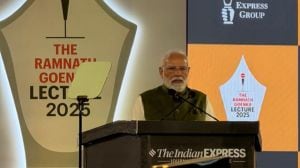But for the tail lights, Indians parked perfectly
Both teams will scrutinise the first day’s scorecard as if it were Harry Potter’s magic mirror. Each will bring its medley of worr...

Both teams will scrutinise the first day’s scorecard as if it were Harry Potter’s magic mirror. Each will bring its medley of worries and thoughts to the inspection, and each will see reflected therein all its anxieties.
With India 23 for one at stumps, in unhurried reply to Pakistan’s first innings total of 224, one would reckon that the advantage is squarely with the visitors. But they began their innings with a stumble. In that self-created hobble they have bared hesitation in their ranks.
So, as John Wright said at end of the first day’s play at the third Test here, the first hour tomorrow will be critical. Only upon taking stock of the wickets in hand at the first drinks break on Wednesday would any forecast of the direction of the match be possible.
India tonight will wind back to their hours in the field and rue the opportunities lost. Pakistan, in turn, will flip through their dismissals and concur with coach Javed Miandad, that they threw away their wickets. Barring a few swinging overs from Lakshmipathy Balaji, both teams will shrug that their respective takes from the three sessions were courtesy the other.
In Lahore Rahul Dravid elected to bat, to back his squad’s strength. In Rawalpindi, it was always expected to be different. And Sourav Ganguly indicated as much, that he give his bowlers first shot at proceedings to extract as much swing and seam from the deceptively green track.
It could be the burden of those great expectations, but India’s pace trio filled their platter with misery for most of the first hour. In their exuberance to adapt their bowling to the situation, to mine the pitch for moisture, Irfan Pathan and Balaji lost control of line and length.
For the first 45 minutes, it was a run fiesta for Imran Farhat and Taufeeq Umar. Pathan and Balaji can have no excuse.
Balaji straightened his act in his fifth over and as immediate reward had Umar trapped leg before for 9. But the early morning portents were in favour of Ashish Nehra, who came on first change to play his part for the first time in the three-Test series.
Rawalpindi’s airport is in close proximity to the stadium and, all through the initial overs, planes were crisscrossing and swerving up above. Nehra’s victory dance resembles an aircraft in gentle flight and it did not take him long to ape the action in the skies.
He had Farhat, the century-maker of Lahore, lbw and Pakistan suddenly chastened at 34 for two. In a marathon spell, broken by lunch, he claimed just two wickets, but gave ample notice that he was truly back to his nippy self after injury. In an aesthetic combo, he had the other Lahore centurion too, Inzamam-ul Haq at 15.
In between those wickets fell Yasir Hameed’s. Yasir continues to bewilder, blending breathtakingly elegant shots with clumsy whacks. There he was leaning into an off-drive, a silken thread binding shoulder, bat and ball. A moment later he threw the kitchen sink at Pathan, to be caught in deserved punishment by the keeper.
Balaji, for his part, had a mid-day resurgence. He piled up four wickets. And thence, it was back to a drift. The man who could have missed out due to injury and the one who came to fill an injury-created vacancy — Mohammad Sami and Fazle Akbar — took Pakistan from 137 for 8 to 207 for 9.
In their 135-ball partnership, they showed up failings in both teams. India struggled to send them back to the shed, in frustration even expending energy in the hot, humid afternoon by trying to bounce the tailenders. And in their hesitant but effective occupation of the crease, Sami and Akbar cast unforgiving mirrors on the impetuosity of their middle order.
India, for their part, must look deep into Virender Sehwag’s first-ball dismissal for self-appraisal. He had not a clue where Shoaib Akhtar’s delivery was pitching and sent it flying to gully, where Yasir made a fumble look like an acrobatic feat. (Note this fact, its import is still unclear, but in partnership with Aakash Chopra, Sehwag did not take first strike.)
It is not that Parthiv Patel’s induction as opener cast any doubts on Sourav Ganguly credibility after he said either he or Yuvraj Singh would open. Any team, any captain, is entitled to all last-minute or tactical changes.
But sending in the keeper, sending in a makeshift opening batsmen, and shielding this long and successful batting line up, with 15 overs to be bowled, in one stroke returned India to those middle ages when the least confident batsman of the side would be sent to open — just so the following guys would gain a modicum of psychological consolation that they were not opening, that they needn’t fear the ferocity of the new ball.
The move to include Yuvraj Singh was born of heightened confidence. The decision to hold him back for later in the batting order betrays an inexplicable case of nerves. Tuesday will offer chances to both teams to make amends.
Today both were riven by negative moves. Chances are, he who crafts the more positive comeback will seize the day.



- 01
- 02
- 03
- 04
- 05




























